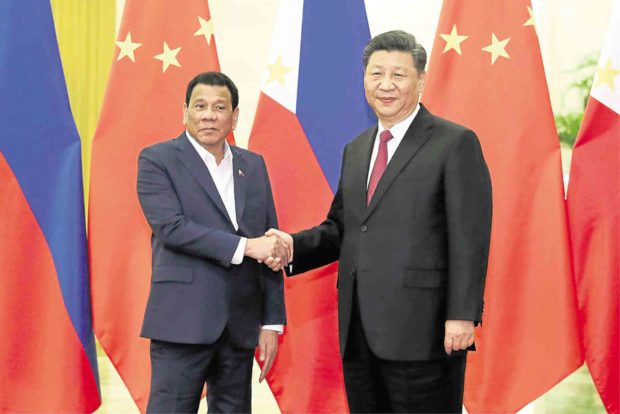SWS: Filipinos’ trust in China dives from ‘neutral’ to ‘poor’

NO TRUST ISSUES HERE President Duterte and Chinese President Xi Jinping during the Philippine leader’s visit to Beijing in April 2019. —AP
Half of Filipinos have “little trust” in China and about as many disagree that China has good intentions for Filipinos, results of the latest Social Weather Stations (SWS) survey showed.
The noncommissioned survey, conducted from June 22 to 26, found that 51 percent of Filipinos said they had “little trust” in China, while 27 percent said they had “much trust” and 21 percent undecided.
This yielded a net trust score (much trust minus little trust) of “poor” -24 for China, 18 points down from the “neutral” -6 in March.
Uncle Sam rates high
SWS classifies a rating of +70 and above as “excellent,” +50 to +69 “very good,” +30 to +49 “good,” +10 to +29 “moderate,” +9 to -9 “neutral,” -10 to -29 “poor,” -30 to -49 “bad,” -50 to -69 “very bad,” and -70 and below “execrable.”
Article continues after this advertisementThe same survey showed that 43 percent of Filipinos disagree (25 percent strongly disagree, 18 percent somewhat disagree) with the statement, “Most of what the Chinese government wants to happen in the Philippines is good for the Filipinos.”
Article continues after this advertisementOnly 27 percent agree (8 percent strongly agree, 19 somewhat agree) that China has good intentions for Filipinos and 30 percent are undecided about the matter.
Test statement
On the other hand, the survey found that 81 percent had “much trust” in the United States, while 8 percent said they had “little trust” and 11 percent were undecided.
This led to a net trust of “excellent” +73 for the United States, which is 13 points higher from the “very good” +60 in March.
Moreover, 55 percent (20 percent strongly agree, 35 percent somewhat agree) agree with the statement, “Most of what the US government wants to happen in the Philippines is good for the Filipinos.” On the other hand, 17 percent disagree (7 percent strongly disagree and 10 percent somewhat disagree) and 28 percent are undecided.
This gives a very strong net agreement score of +39 (correctly rounded) for the United States—up 31 points from the neutral +8 in December 2005, and the highest since the record-high very strong +40 in May 1986.
SWS said it first fielded the test statement, “Most of what the American government wants to happen in the Philippines is good for the Filipinos,” in July 1985, and implemented it 11 times during the Cory Aquino administration, six times during the Ramos administration and three times during the Arroyo administration. The June 2019 survey was its first implementation under the Duterte administration.
Other countries
The survey also showed that all the five other countries tested for public trust—Canada, Australia, Japan, New Zealand, and Malaysia—obtained good net trust ratings.
The survey used face-to-face interviews of 1,200 adults (18 years old and above) nationwide: 300 each in Metro Manila, Balance of Luzon, Visayas and Mindanao, with sampling error margins of plus-minus 3 percent for national percentages and plus-minus 6 percent each for the said areas. —INQUIRER RESEARCH